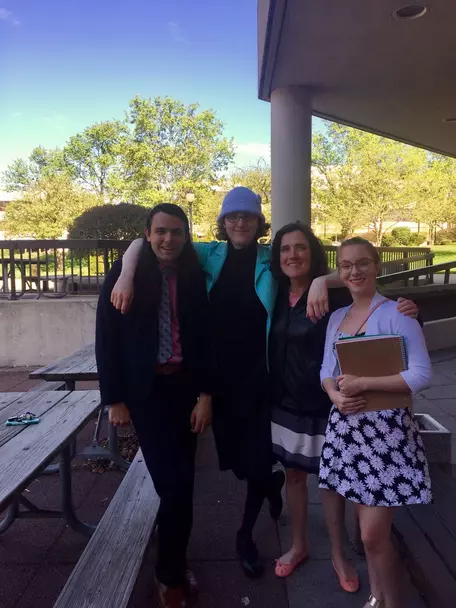Initial Publication Date: April 9, 2018
Community and Political Engagement in the Geosciences
This suite of pages was developed by Sarah Fortner, Wittenberg University with contributions from Rob Baker, Wittenberg University

×
- Democratic Outcomes Guide Engagement: Offers guidance to geoscience faculty or professionals interested in public engagement. Reflect on professional goals and activities and align them with goals for democracy (i.e. informed public, local power, meeting community needs, justice) that guide engagement activities.
- Designing Courses around Local Issues: Design courses around local geoscience issues and community priorities and explore a course design template and reflection assignment tips. Think about how environmental justice, stormwater, climate, hazards and other resilience toolkits might apply to decisions in your community.
- Develop Locally-Relevant Talking Points: Considers how your research or consensus documents may be presented with local concerns in meetings with representatives.
- Political & Community Activities: Features starting-place activities that help students environmental justice and policy issues. Activities explore the complexity of communication, decision making, and empowerment of underrepresented and marginalized constituents.
- Strategies for Reaching New Audiences: Provides tips for writing Op-Eds, blogs, podcasts, and using social media to reach target audiences.
- Measuring and Evaluating Civic Learning and Program Engagement: Includes resources for civic learning and attitudes and program evaluation.
- Political Talk is Important to Democracy: Essay reflects on the large number of independent voters and that necessitates political engagement. Includes resources to support respectful conversations in class that explore initial perspectives and move toward building informed opinions.
- Build Workforce & Civic Context in Your Seminar. Turn your invited talk, seminar series, or web lectures into an opportunity for student reflection on career path or civic action.
- Advocacy Events: Includes examples of advocacy events and as well as a template for planning events as part of your course or within your campus. Students learn directly how their actions directly support campus, local, and national political solutions on geoscience issues.
Also see this Service learning module for activities and strategies to join community and civic engagement with student professional training (NAS, 2016; Syzmanski et al., 2012).
Get more ideas from the Serving Our Communities Blog »
References
- AAC&U, 2008, Essential Learning Outcomes
- American Geosciences Institute, Critical Needs for the Twenty-First Century: The Role of the Geosciences
- Brantmeier, E., Broscheid, A., Moore, C., Inclusion by Design: Survey your syllabus and course design
- Baker, John R. Government in the Twilight Zone: Volunteers to Small-city Boards and Commissions. SUNY Press, 2015.
- EPA, 2014, Climate Adaptation Resources and Guidance
- Intergovernmental Panel on Climate Change, 2014, Fifth Assessment Report, Climate Change 2014: Mitigation of Climate Change
- National Academies of Sciences, Engineering, and Medicine, 2017, Service-Learning in Undergraduate Geosciences: Proceedings of a Workshop. Washington, DC: The National Academies Press. doi: 10.17226/24621.
- PEW Research Center, 2016, Millennials approach Baby Boomers as America's largest generation in the electorate
- Southern Poverty Law Center, 2017, Teaching Tolerance: Educating for a Diverse Democracy
- Syzmanki, D.W., Hadlock, C. and Zlotkowski, 2012, Using Public Sector Research Projects to Engage Undergraduates, CURQ, 19-26.
![[creative commons]](/images/creativecommons_16.png)